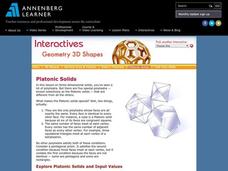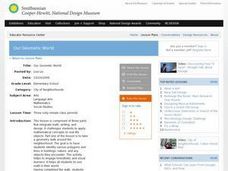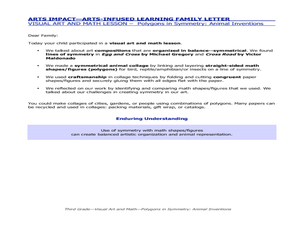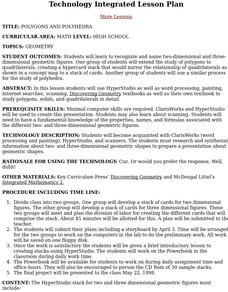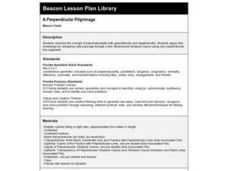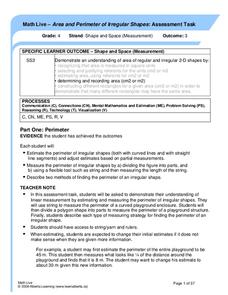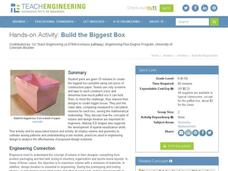Annenberg Foundation
Geometry 3D Shapes: Platonic Solids
From polyhedrons to platonic solids, here is a lesson that will have your classes talking! As an introduction to platonic solids, scholars cut and fold nets to create the three-dimensional solids. They use an interactive component to...
Annenberg Foundation
Geometry 3D Shapes: Surface Area and Volume
Whether you wrap it or fill it, you're using geometric concepts. Classmates use an interactive approach to learn how to find volume and surface area of cylinders and prisms in the second lesson in a five-part series. The online lesson...
Curated OER
Net "Working"
Upper elementary and middle schoolers explore the properties of various polygons. They use video, resource links, and engage in hands-on activities in order to construct geometric nets. This fine plan should lead to increased...
Curated OER
Pop-it...Stop-it
Students observe how certain geometric shapes can be used to make some structures rigid and others flexible. The activity involves construction of a 30-60 right triangle, folding while following directions, and identifying polygons.
Curated OER
Our Geometic World
Young scholars walk around the neighborhood and identify various polygons and lines in buildings, nature and other objects. They design a building using various geometric patterns, shapes and lines. Students complete a descriptive...
Curated OER
Using the Web to Explore Shapes
Third graders research the Internet to locate geometric designs in familiar buildings. They review shapes, solids, angles and symmetry as they research websites of familiar buildings in Louisville. They record the information they see...
Curated OER
Polygons in Symmetry: Animal Inventions
Fourth graders use polygons to create animal figures with symmetry. For this polygons and symmetry lesson, 4th graders create a symmetrical animal collage by cutting and gluing geometric shapes and figures from math activities.
Curated OER
Polygons And Polyhedra
Students recognize and name two-dimensional and three-dimensional geometric figures. One group of students will extend the study of polygons to quadrilaterals while another group of students will extend the study of polygons to...
Curated OER
Circles, Cylinders, Cones and Spheres
In this comparing geometric figures worksheet, students continue patterns and observe circles. In this problem solving worksheet, students answer seven questions.
State of Michigan
Pre-K Mathematics
Kick-start children's education with this pre-school math unit. Offering 31 different hands-on learning activities that develop young mathematicians' pattern and shape recognition, basic number sense, and much more, this is a...
Curated OER
A Perpendicular Pilgrimage
Ninth graders design a safe passage through a 2-D obstacle. In this geometric math lesson, 9th graders engage in a hands on activity to better understand the concept of geometric and algebraic perpendicularity. Students will work in...
Curated OER
Equations and Inequalities
In this equations and inequalities worksheet, 9th graders solve and complete 10 different multiple choice problems that contain various equations. First, they determine the solutions to a number of different equations given. Then,...
Curated OER
Length, Perimeter, and Area
Pupils explore the concepts of length, perimeter, and area. In this math instructional activity, students use Shape Explorer to practice finding length, perimeter, and area.
Curated OER
Investigation-Looking at Polygons
Eighth graders plot points and investigate polygons. They locate a point, using ordered pairs of integers on the coordinate plane. Students compare geometric measurements and computations on coordinate axes as they are applied to...
Curated OER
A Rectangular Prism and Its Net
Identify the nets for prisms and other geometric shapes. Learners calculate the surface area of the rectangular prism then sketch the shapes of prisms and other polygons. Unfolded cereal boxes are used as a visual aid, great idea!
Mrs. Burke's Math Page
The Amazing Pi Race
Add a sense of excitement to your math class with this race across the country. Using their knowledge of all things circular, young mathematicians work in pairs answering a series of pi-related word problems as they hop from one city to...
Arizona Department of Education
Area and Perimeter of Regular and Irregular Polygons
Extend young mathematicians' understanding of area with a geometry lesson on trapezoids. Building on their prior knowledge of rectangles and triangles, students learn how to calculate the area of trapezoids and other...
Learner
Solid Shapes
A collection of two lessons, kindergartners will identify two-dimensional shapes in solid shapes. They will develop basic knowledge of the components that make up a sphere, rectangular prism, pyramid, cylinder, cone, and cube. Young...
Alberta Learning
Area and Perimeter of Irregular Shapes
Evaluate young mathematicians' understanding of area and perimeter with this series of three assessment tasks. Challenging students to not only calculate the area and perimeter of irregular shapes, but to explain in writing their...
Teach Engineering
Let's Learn About Spatial Viz!
Can you see your class working on spatial visualization? The first installment of a five-part module introduces the concept of spatial visualization and provides a 12-question diagnostic assessment to test spatial visualization skills....
Savvas Learning
Saxon Math 5/4
You'll never have to search for another worksheet again after downloading this extensive collection of Saxon math materials. With over 600 pages of example problems and skills practice exercises, this is a must-have resource...
Curated OER
Figure This! Math Challenges for Families
Young mathematicians complete a family math challenge packet. They will complete a packet of mixed math activities. They work with graphs, comparing numerical data, tessellations, and probability.
Teach Engineering
Build the Biggest Box
Boxing takes on a whole new meaning! The second installment of the three-part series has groups create lidless boxes from construction paper that can hold the most rice. After testing out their constructions, they build a new box....
Noyce Foundation
Part and Whole
Now you'll never have trouble cutting a cake evenly again. Here is a set of five problems all about partitioning shapes into a given number of pieces and identifying the fractional amount of each piece. As learners progress through the...
